
Apara Ekadashi, a day of immense spiritual significance, is observed to seek divine grace, liberation from sins, and ultimate salvation. This sacred occasion, dedicated to Bhagwan Vishnu, falls on the Ekadashi (eleventh day) of the Krishna Paksha (waning phase of the moon) in the month of Vaishakha. It is revered for its power to absolve past misdeeds, purify the mind and soul, and bestow spiritual elevation upon sincere devotees.
In 2026, Apara Ekadashi will be observed on Wednesday, May 13. This holy day is marked by fasting, prayer, and the chanting of Vishnu mantras. Devotees engage in the recitation of sacred scriptures such as the Vishnu Sahasranama and Bhagavad Gita, seeking the Bhagwan’s blessings for inner transformation and divine wisdom. Observing Apara Ekadashi with unwavering faith is believed to remove obstacles, grant peace, and lead the soul toward liberation (moksha).
This sacred observance serves as a profound reminder of the path of righteousness, the power of divine surrender, and the boundless compassion of Bhagwan Vishnu, who grants liberation to those who seek refuge in Him with a pure and devoted heart.
Significance & Importance of Apara Ekadashi
Apara Ekadashi, a highly revered observance dedicated to Bhagwan Vishnu, holds profound spiritual significance as a day of divine purification, liberation, and boundless grace. Falling on the Ekadashi of Krishna Paksha in the month of Vaishakha, this sacred fast is believed to absolve past sins, cleanse the mind and soul, and guide the devotee toward the path of moksha. The very name 'Apara,' meaning 'immeasurable' or 'boundless,' signifies the vast spiritual merit gained by those who observe this Ekadashi with devotion and sincerity.
The Padma Purana extols Apara Ekadashi as a day of immense divine power capable of erasing all past misdeeds, whether committed knowingly or unknowingly. Just as the sacred waters of the Ganga wash away impurities, this Ekadashi purifies the devotee’s karma, removing the burdens of ignorance, greed, and ego. It is believed that observing Apara Ekadashi with unwavering faith grants divine blessings, protection from negative karmic consequences, and freedom from the cycle of birth and death. Bhagwan Vishnu, the preserver of the universe, bestows spiritual elevation upon those who surrender to Him on this auspicious occasion, leading them toward enlightenment and eternal peace.
This Ekadashi is not only a path to liberation but also a source of divine prosperity, removing obstacles and bestowing inner strength, clarity of thought, and unwavering devotion. It is said that those who observe this sacred fast with a pure heart attain spiritual wisdom and divine grace, ensuring progress on the path of dharma and righteousness. Apara Ekadashi serves as a powerful reminder of Bhagwan Vishnu’s boundless compassion and the infinite blessings that await those who seek refuge in Him with sincerity and devotion.
Stories of Apara Ekadashi Festival
The story behind Apara Ekadashi is rooted in the divine teachings of Bhagwan Vishnu and the immense spiritual power of this sacred observance. As described in the Padma Purana, this Ekadashi is celebrated for its ability to cleanse sins and grant liberation to those who observe it with unwavering devotion.
Once, Yudhishthira Maharaj, the eldest of the Pandavas, humbly asked Bhagwan Krishna about the significance of Apara Ekadashi and the merits attained by observing it. In response, Shri Krishna narrated the glories of this auspicious day, explaining how it removes all forms of past sins and grants spiritual upliftment. Bhagwan Krishna described that observing Apara Ekadashi with devotion is as meritorious as donating gold in charity, performing yajnas, and taking a sacred dip in the holy Ganga.
A well-known legend associated with this Ekadashi tells the story of a noble but unfortunate warrior who, despite his bravery and righteousness, met an untimely and dishonorable end in battle. Due to the circumstances of his death, he was unable to attain peace in the afterlife. However, by the grace of Bhagwan Vishnu, he was blessed with the knowledge of Apara Ekadashi. With deep devotion, he observed the fast, and as a result, his sins were absolved, and he attained Vaikuntha, the divine abode of Bhagwan Vishnu.
Another legend speaks of a deceitful and greedy king who ruled with arrogance and injustice. Despite his worldly power, his actions led him into darkness, and he faced the consequences of his sinful life. However, by the divine intervention of a saint, he learned about the immense merits of Apara Ekadashi and observed it with true repentance. Through this act of devotion, his past sins were washed away, and he was granted redemption.
These stories highlight the transformative power of Apara Ekadashi, emphasizing the importance of righteousness, devotion, and surrender to Bhagwan Vishnu. The festival serves as a reminder that no matter how burdened one may be by past mistakes, sincere devotion and the observance of dharma can lead to spiritual purification and ultimate liberation. Observing Apara Ekadashi with a pure heart ensures the removal of obstacles, bestows divine wisdom, and leads the soul toward eternal peace in the divine presence of Bhagwan Vishnu.
Festival Date, Time, Muhurat & Tithi
Apara Ekadashi will be observed on
Tuesday, May 12, 2026.
Ekadashi Tithi (11th lunar day) of the Krishna Paksha in the Vaishakha month as per the lunar calendar.
Key Timings for Apara Ekadashi 2026:
Apara Ekadashi on Tuesday, May 12, 2026
On 13 th May, Parana Time - 02:42 PM to 05:38 PM
On Parana Day Hari Vasara End Moment - 09:27 AM
Ekadashi Tithi Begins - 05:22 AM on May 12, 2026
Ekadashi Tithi Ends - 03:59 AM on May 13, 2026
Apara Ekadashi Parana
Vaishnava Apara Ekadashi on Wednesday, May 13, 2026
On 14 th May, Parana Time for Vaishnava Ekadashi - 05:53 AM to 08:50 AM
On Parana Day Dwadashi would be over before Sunrise
Ekadashi Tithi Begins - 05:22 AM on May 12, 2026
Ekadashi Tithi Ends - 03:59 AM on May 13, 2026
Note: Sunrise and sunset vary by region and date due to India's geographical diversity. For exact timings, please refer to local astronomical data.
What to Do on Apara Ekadashi
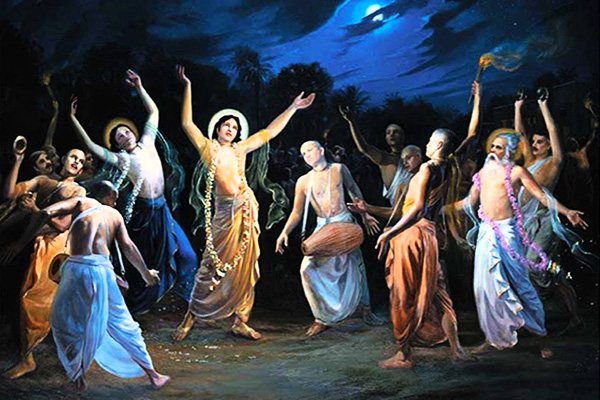
The observance of Apara Ekadashi is deeply rooted in sacred Hindu traditions and scriptures, emphasizing devotion, self-discipline, and spiritual purification. The rituals associated with this auspicious day are prescribed in ancient texts and should be followed with sincerity and unwavering faith. Those who decide to fast on this sacred occasion must take special care in adhering to the prescribed rites with complete dedication, ensuring that the observance is performed with purity of mind and heart.
The preparations for Apara Ekadashi begin on the Dashami Tithi, the 10th day of Krishna Paksha. On this day, the devotee should cleanse themselves thoroughly in the afternoon and consume a simple and sattvic meal before sunset. The significance of this preparatory step lies in ensuring the body and mind are purified for the strict fasting that follows on Ekadashi. On the morning of Ekadashi, the devotee should take a sacred bath, preferably in a river, which is believed to have the most purifying effect. If a river or water body is not accessible, bathing at home with full devotion while mentally seeking forgiveness for past sins is recommended. During the bath, a prayer should be chanted to Mother Earth, seeking liberation from accumulated karmic burdens and entry into the divine abode of Bhagwan Vishnu.
Fasting is a key element of Apara Ekadashi, and those who observe it completely refrain from food and water until the next day. Those who undertake this vrata with full devotion should offer a heartfelt prayer to Bhagwan Vishnu, seeking His divine protection and blessings. Worship of Bhagwan Vishnu or Krishna is performed with utmost reverence, with offerings of flowers, water, and an excellent 'Bhog' (sacred food offering). The devotee should light a lamp in honor of the Bhagwan and engage in continuous chanting of His holy names, filling the home with divine vibrations. Singing devotional songs and hymns dedicated to Bhagwan Vishnu helps in maintaining a blissful and spiritually uplifting atmosphere throughout the day.
A significant aspect of Ekadashi fasting is remaining awake throughout the night, dedicating the time to devotional practices such as Kirtan and Bhajan. This act of wakefulness symbolizes a conscious effort to rise above worldly distractions and remain immersed in divine thoughts. Devotees who are musically inclined often play instruments and sing praises of the Bhagwan, thereby enhancing the spiritual ambiance. This night-long vigil is an essential practice, as it strengthens devotion and brings immense spiritual merit to the observer.
On the morning of Dwadashi, the devotee should break the fast with great humility and gratitude. Before consuming any food, one must first offer a prayer to Bhagwan Vishnu, seeking His blessings before eating. Those who have observed a complete fast should recite the sacred eight-syllable mantra three times and then drink water sanctified by being offered to the Bhagwan. It is also customary to give charity to Brahmanas, seeking their blessings and forgiveness for any unintended offenses committed during the observance. The act of giving in charity enhances the spiritual benefits of the Ekadashi fast and pleases Bhagwan Vishnu.
From the beginning of Ekadashi until the completion of the fast on Dwadashi, the devotee should remain devoted to Bhagwan Vishnu, engaging in prayers, devotional singing, scriptural reading, and acts of charity. Some devotees also perform fire sacrifices to intensify the spiritual potency of their observance. The ultimate purpose of Apara Ekadashi is to detach from worldly distractions, purify the soul, and deepen one’s connection with Bhagwan Vishnu, thereby attaining divine grace and eternal peace.
Apara Ekadashi Festival Puja Vidhi (Puja Procedure)
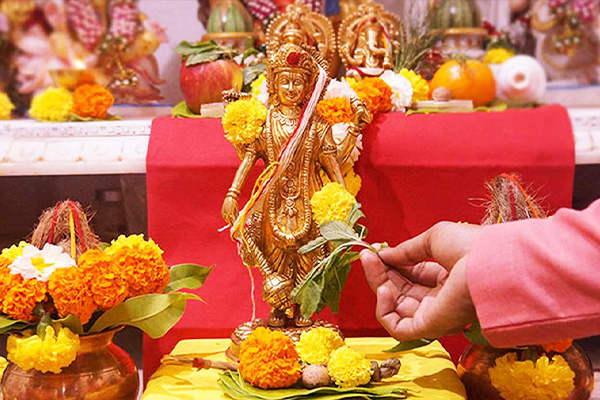
Apara Ekadashi is a sacred day dedicated to Bhagwan Vishnu, observed with deep devotion and spiritual discipline. The Puja Vidhi (ritual procedure) involves fasting, prayer, and acts of devotion to purify the soul and attain divine blessings.
- Purification and Sankalpa: On the morning of Ekadashi, take a holy bath, preferably in a river, or bathe at home with full devotion while praying to Mother Earth for purification. Offer a heartfelt Sankalpa (resolve) to observe the fast with dedication.
- Installation of Bhagwan Vishnu’s Idol or Picture: Place an idol or image of Bhagwan Vishnu or Shri Krishna on a clean altar. Decorate the altar with flowers, a lamp, and sacred offerings.
- Offering of Bhog and Worship: Prepare and offer sattvic (pure) food as Bhog, along with flowers, fruits, incense, and Tulsi leaves. Recite Vishnu Sahasranama or other sacred hymns in His praise.
- Lighting a Ghee Lamp: Light a lamp in honor of Bhagwan Vishnu, symbolizing the removal of darkness and ignorance. Offer deepa (lamp) aarti while chanting Vishnu mantras with devotion.
- Engaging in Kirtan and Bhajan: Throughout the day, sing devotional songs, recite Bhagwan Vishnu’s glories, and read from sacred scriptures such as the Bhagavad Gita or Vishnu Purana.
- Night Vigil and Devotional Practices: Stay awake throughout the night, meditating, chanting Vishnu mantras, and listening to spiritual discourses. If possible, participate in Kirtan and Bhajan to keep the mind immersed in devotion.
- Parana (Breaking the Fast) and Charity: On Dwadashi morning, offer prayers to Bhagwan Vishnu before breaking the fast. Recite the eight-syllable mantra and drink sanctified water. Perform charity by offering food, clothes, or donations to Brahmanas and the needy.
Observing Apara Ekadashi with full faith and devotion bestows divine blessings, purifies the soul, and leads the devotee towards spiritual liberation and eternal grace of Bhagwan Vishnu.
Apara Ekadashi Puja Mantras
The following two mantras are particularly significant for this festival, as they invoke the divine presence of Shri Krishna and Bhagwan Vishnu, bestowing spiritual purification, liberation from past sins, and ultimate devotion.
Hare Krishna Maha Mantra
Hare Krishna, Hare Krishna, Krishna Krishna, Hare Hare, Hare Rama, Hare Rama, Rama Rama, Hare Hare
This is the Mahamantra, a supremely powerful and divine chant that connects the devotee with Bhagwan Krishna. It glorifies the names of Krishna and Rama, invoking the supreme energy (Hare) of the Divine. Chanting this mantra repeatedly during Apara Ekadashi fills the mind with devotion, removes negativity, and leads to bhakti (pure devotion). It is said that constant chanting of the Maha Mantra cleanses the heart and brings the devotee closer to liberation (moksha).
Om Namo Bhagavate Vasudevaya
This is the Dvadasakshari (12-syllable) mantra dedicated to Bhagwan Vishnu, meaning 'I bow to Bhagwan Vasudeva (Krishna, the Supreme Being)'. This sacred chant is mentioned in the Srimad Bhagavatam and is revered as a moksha-mantra, leading to self-realization and divine grace.
Chanting this mantra on Apara Ekadashi invokes the blessings of Bhagwan Vishnu, removes obstacles, and grants spiritual upliftment. By reciting these powerful mantras throughout Apara Ekadashi, devotees surrender their minds to Bhagwan Vishnu, purify their souls, and experience the divine presence that leads them toward salvation and eternal peace.
Apara Ekadashi Vrat Vidhi (Fasting Procedure)
The observance of Ekadashi Vrat is described in the ancient scriptures, emphasizing strict adherence to specific rules to attain its full spiritual benefits. Observing Apara Ekadashi with devotion, discipline, and purity helps in spiritual upliftment, removal of sins, and attaining Bhagwan Vishnu’s grace.
Guidelines for Observing the Fast
- Purification and Morning Rituals: The devotee should take a bath early in the morning on Ekadashi, purifying the body and mind before beginning the fast.
- Dietary Restrictions: Consumption of beans, grains, and pulses is strictly prohibited. These foods are believed to interfere with the purification process and are to be avoided completely.
- Ahimsa (Non-violence): Killing any living being is strictly forbidden on this sacred day, as the principle of non-violence (ahimsa) is central to the observance of Ekadashi.
- Wakefulness and Spiritual Engagement: Sleeping during the day on Ekadashi and the following day (Dwadashi) is not permitted. Instead, one should engage in prayers, chanting, and devotional activities to remain spiritually immersed.
- Avoiding Negative Associations: Devotees should refrain from associating with dishonest individuals, frauds, or those involved in unethical activities. If one unknowingly comes into contact with such people, the scriptures advise standing under the sun and gazing at it briefly for purification.
- Restraint and Abstinence: Activities such as gambling, alcohol consumption, and indulgence in sensual pleasures are strictly prohibited on both Ekadashi and Dwadashi, ensuring complete physical and mental purity.
-
Dwadashi Observances:
On the day after Ekadashi (Dwadashi), devotees should:
- Eat only one meal and avoid consuming honey and black lentils (urad dal).
- Avoid eating food at another person’s house.
- Avoid eating from utensils made of bell metal.
- Refrain from applying oil on the body for massage.
- Breaking the Fast (Parana): If, due to unavoidable reasons, the devotee is unable to break the fast on Dwadashi, they should at least drink water to signify the completion of the fast before consuming food later when convenient.
-
Food Items to Avoid During Apara Ekadashi
During Apara Ekadashi, devotees strictly abstain from certain foods that are believed to disturb the sanctity of the fast:
Grains: Wheat, rice, barley, corn, millet, and all grain-based products.
Lentils and Legumes: Beans, chickpeas, peas, and other pulses.
Onions and Garlic: These are considered to increase rajasic and tamasic energies, leading to restlessness and indulgence.
Brinjal (Eggplant): Avoided by some due to its association with tamasic qualities.
Mushrooms: Considered impure and unsuitable for fasting.
Hing (Asafoetida): Some devotees refrain from using it as it may disturb mental clarity.
Non-vegetarian Food: All forms of meat, fish, and eggs are strictly avoided.
Alcohol and Stimulants: Consumption of alcohol, caffeine, or other intoxicants is strictly forbidden.
Fermented Foods: Yogurt, cheese, vinegar, and other fermented items are typically avoided.
Processed and Packaged Foods: Artificial additives, preservatives, and chemically processed foods are considered impure and should be avoided.
Recommended Diet During Apara Ekadashi
Instead of the prohibited food items, devotees can consume a simple and sattvic diet that includes:
- Fruits, nuts, and dairy products such as milk, curd, and ghee.
- Root vegetables like potatoes, sweet potatoes, and yam.
- Flour made from water chestnut (Singhara) or buckwheat (Kuttu) for preparing Ekadashi-compliant dishes.
Fasting on Apara Ekadashi with strict adherence to these guidelines enhances spiritual consciousness, purifies past karma, and bestows divine blessings. Following the prescribed rules ensures that the fast is observed in its purest form, leading to spiritual elevation, peace, and Bhagwan Vishnu’s grace.
Apara Ekadashi Vrat Katha (Traditional Fasting Story)
.jpg)
Once, in the prosperous city of Champaknagar, there ruled a noble and virtuous king named Mahidhara. He was renowned for his wisdom, justice, and unwavering devotion to Dharma. Under his rule, the kingdom flourished, with citizens living in harmony and prosperity. However, despite his noble character and righteous governance, King Mahidhara carried a deep sorrow in his heart—a sorrow that no wealth or power could alleviate. His only son, the prince and heir to the throne, had fallen into a life of arrogance, disrespect, and sinful indulgences.
The young prince, instead of following the noble footsteps of his father, had become disrespectful, reckless, and devoid of virtue. He surrounded himself with deceitful companions, indulged in excessive pleasures, and paid no heed to the teachings of the scriptures or the advice of wise ministers. The king, despite all his efforts, failed to bring his son onto the righteous path. His heart ached to see his own flesh and blood straying towards adharma (unrighteousness), and he feared that the prince’s misdeeds would not only bring dishonor to their lineage but also ruin the future of the kingdom.
Consumed by worry and despair, King Mahidhara sought guidance from the sages and saints who resided in the sacred groves and ashrams of his land. He humbly approached them, narrated his troubles, and sought their divine counsel. Seeing the king’s genuine concern and his unwavering faith in Dharma, the sages advised him, “O noble king, the observance of Apara Ekadashi, the sacred fast dedicated to Bhagwan Vishnu, holds the power to cleanse even the gravest of sins. If observed with true devotion and purity of heart, it can remove all past karmic impurities and bestow divine blessings. Observe this fast with sincerity, and the merciful Bhagwan Vishnu will guide your son towards righteousness.”
Determined to save his son’s soul, King Mahidhara resolved to observe the fast of Apara Ekadashi with utmost devotion. On the sacred day, he bathed in the holy river at dawn, purified his mind and body, and took a solemn vow of fasting. He adorned the temple of Bhagwan Vishnu with fresh flowers, fragrant incense, and golden lamps, and spent the entire day immersed in bhajan (devotional songs), kirtan (congregational chanting), and deep meditation upon the Bhagwan’s divine form. He refrained from food and drink, dedicating every moment to prayers, scripture recitations, and chanting the sacred names of Vishnu.
As the night deepened, King Mahidhara, despite his physical exhaustion, remained awake in complete devotion, singing praises of the Supreme Bhagwan. His heart overflowed with faith, surrender, and unwavering hope that Bhagwan Vishnu would bless him and show mercy upon his wayward son. Seeing his unshakable determination and selfless devotion, the divine Bhagwan Shri Hari Vishnu appeared before him in a radiant and resplendent form, adorned with celestial ornaments, holding the divine conch, discus, mace, and lotus in His four hands. The entire temple was illuminated with a divine glow, and a celestial fragrance filled the air.
With folded hands and tears of devotion streaming down his face, King Mahidhara prostrated before Bhagwan Vishnu and prayed, “O Bhagwan of the Universe, You are the protector of Dharma and the savior of the fallen. I seek not wealth, power, or victories, but only the redemption of my son’s soul. Kindly bless him with wisdom, humility, and devotion so that he may walk the righteous path.”
Pleased with the king’s unwavering faith and selfless prayers, Bhagwan Vishnu, with a gentle smile, bestowed His divine blessings upon the king and his family. He declared, “O noble king, your devotion has touched My heart. Your son, blinded by illusion, will soon awaken to the truth. By the power of your Apara Ekadashi fast, he shall be freed from his sinful tendencies and emerge as a righteous and just ruler.”
As soon as Bhagwan Vishnu disappeared, a miraculous transformation took place within the prince’s heart. He awoke the next morning with a renewed sense of wisdom and clarity, as though the veil of ignorance had been lifted. Realizing his past mistakes and the pain he had caused his father, he fell at the feet of King Mahidhara and begged for forgiveness. From that day onward, the young prince renounced his wayward ways, embraced the path of Dharma, and became a model of virtue and righteousness.
Filled with immense gratitude and devotion, King Mahidhara continued to observe Apara Ekadashi every year, inspiring his subjects to do the same. His kingdom, now under the divine grace of Bhagwan Vishnu, prospered like never before, and the people lived in peace, abundance, and spiritual fulfillment.
Thus, the observance of Apara Ekadashi is believed to have the power to wash away even the gravest of sins, grant divine blessings, and bring prosperity, happiness, and transformation. It is a day of fasting, prayer, and unwavering devotion to Bhagwan Vishnu, wherein devotees seek forgiveness, purification, and the ultimate grace of the Supreme Bhagwan.
Puja Utensils, Essentials
Rudra Centre
brings an extensive collection of Puja Articles which caters to all that is required for daily and special Puja Vidhis. We offer variants of designs and sizes in each category. The list includes handcrafted Puja Mandirs, Puja Pedestals, offering Bowls, Panchpatra, intricately carved Puja Thalis, Abhishek Vessels, in different materials, Pure Silver/German Silver articles like Kalash, set of Shodash Upachara and Several other Puja Articles, which we deliver at your doorstep.
Visit the complete collection:
Vishnu Puja
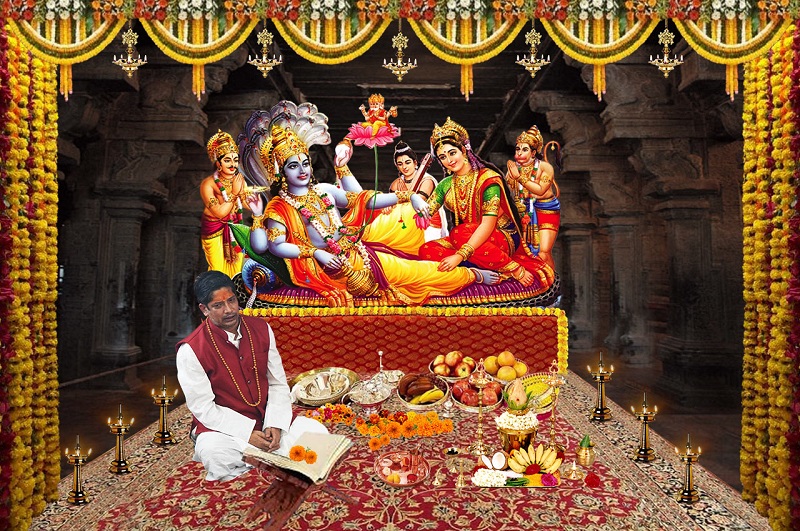
Click Here to Book Ekadashi Puja
The purpose of performing the Anant Vishnu Puja is to attain blessing of Bhagwan Anant Vishnu and to blessed by materialistic comforts, peace of mind and happiness. This divine form of Bhagwan Vishnu is also worshipped to regain lost wealth. The Vaishnavites, revere Him as the Supreme deity, one who has no beginning and no end.
The benefits of performing the Anant Vishnu puja is as follows:
- Offers divine blessings of Bhagwan Vishnu
- Offers divine blessings of Goddess Lakshmi
- Invites riches and prosperity
- Offers success and growth in all undertakings
- Helps to recover lost wealth
- Offers overall abundance
- Offers contentment and bliss
- Offers protection from negative energies and evil spirits
- Fills life with happiness
Rudra Centre Puja Services
is the oldest and most trusted Online Puja Services provider in the world. Over 20 years we have organized Yagnas, Pujas, Homas and Kathas like Ati Rudra Mahayajna, Sahasra Chandi Homa, Akhand Ramayan Paath, Shiva Maha Puran Katha, 4 Prahar Mahashivratri Mahapuja with teams of 100’s of curated priests for the benefit of mankind and our global clientele.
Book here:
Conclusion
Apara Ekadashi stands as a sacred gateway to spiritual purification, divine grace, and moral upliftment. Observed with unwavering devotion, fasting, and prayers, this auspicious day is believed to wash away past sins, grant clarity of thought, and bestow the boundless blessings of Bhagwan Vishnu. The festival serves as a reminder of the transformative power of Bhakti (devotion), the importance of Dharma (righteousness), and the eternal mercy of the Supreme Bhagwan upon His devotees.
Through sincere observance of Apara Ekadashi, one can transcend worldly attachments, seek forgiveness for past transgressions, and attain inner peace, spiritual wisdom, and prosperity. It is a day to immerse oneself in divine contemplation, engage in acts of charity, and cultivate virtues that lead to eternal liberation (Moksha). As devotees chant the holy names of Bhagwan Vishnu and offer their heartfelt prayers, they invoke His divine presence, ensuring their path is illuminated with righteousness, humility, and unwavering faith.
Thus, Apara Ekadashi is not merely a day of fasting but a sublime spiritual opportunity—a means to cleanse the soul, strengthen devotion, and move closer to the supreme truth and eternal bliss of Bhagwan Vishnu's divine abode.


-in-Astrology.jpg)
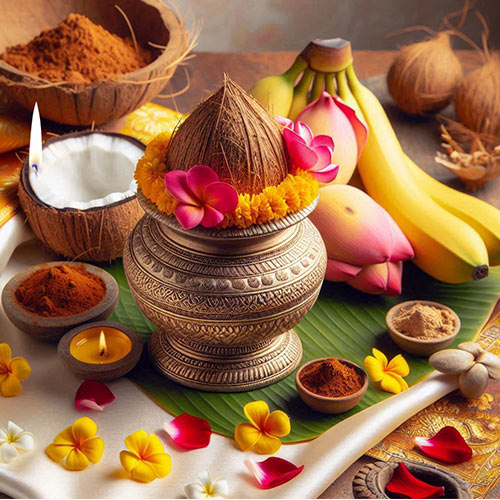
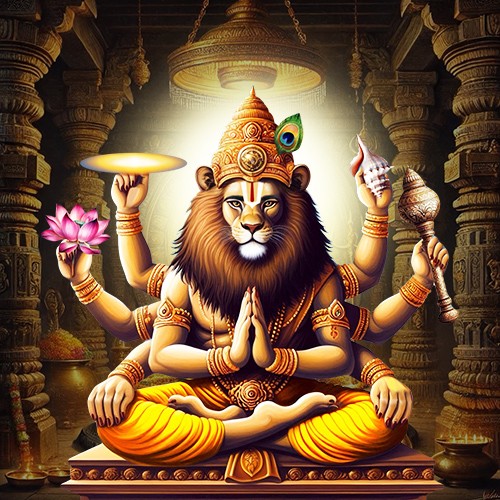
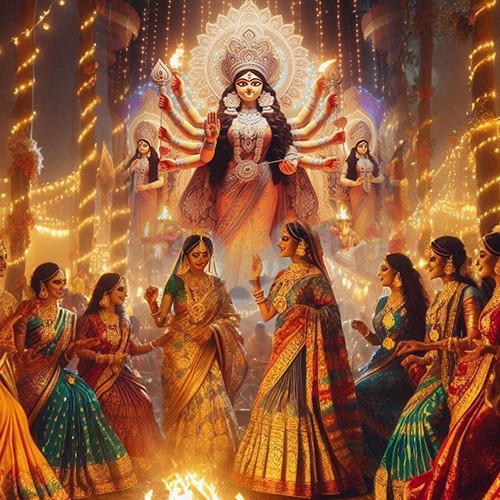
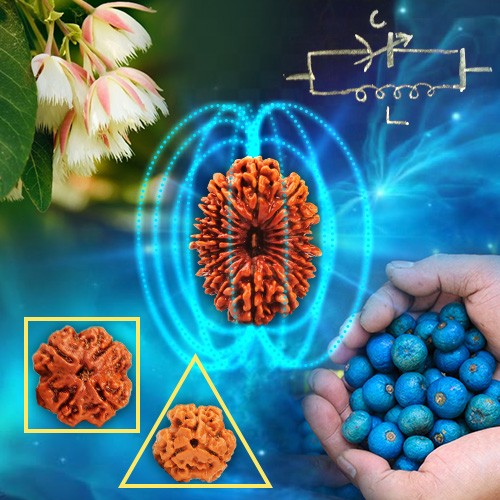

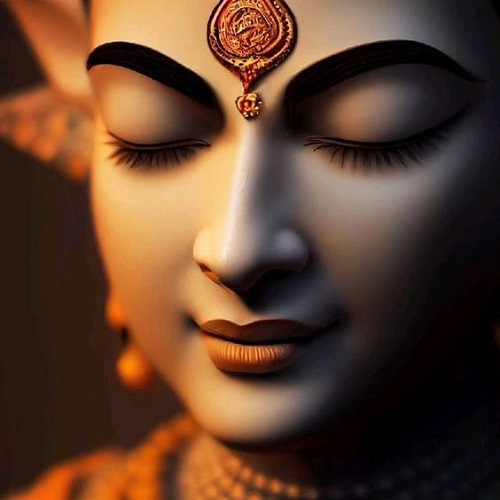
.jpg)
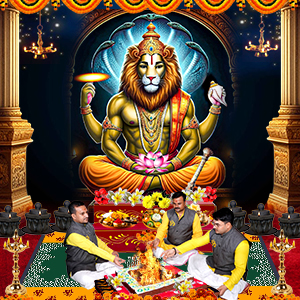
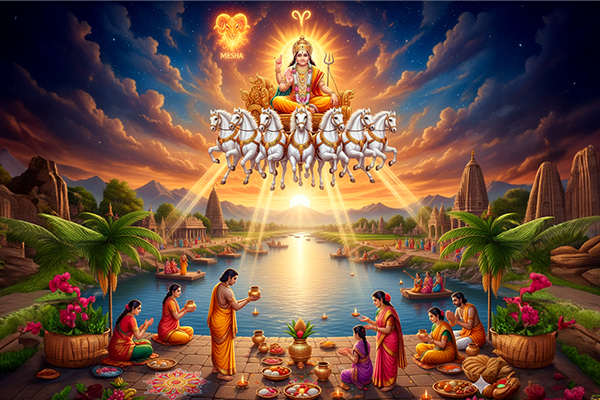

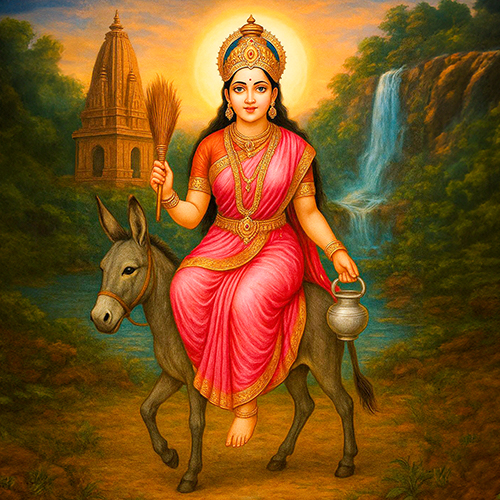
Comments 0
Leave your thought here